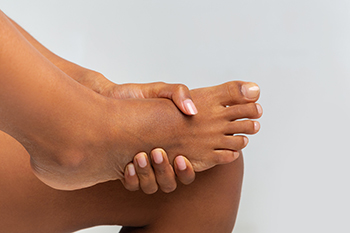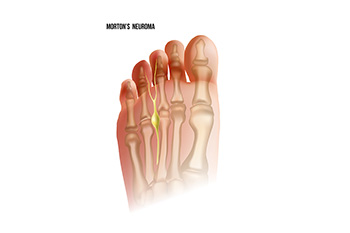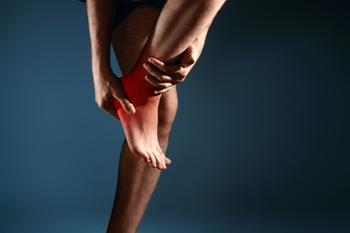Items filtered by date: December 2023
Definition and Causes of Tarsal Tunnel Syndrome

Tarsal tunnel syndrome, abbreviated TTS, is a relatively rare but painful condition involving the compression of the tibial nerve as it passes through the tarsal tunnel, a narrow passageway on the inside of the ankle. The tarsal tunnel is enclosed by bone and ligaments, and when pressure is exerted on the tibial nerve within this space, it can lead to TTS. The exact causes of tarsal tunnel syndrome can vary, but common factors include injury or trauma to the ankle, such as sprains or fractures, which may lead to swelling and compression of the nerve. Overpronation, where the foot rolls excessively inward, can also place additional stress on the tibial nerve. Other factors contributing to TTS may include systemic conditions like diabetes, which can result in nerve inflammation and entrapment. Recognizing the potential causes of tarsal tunnel syndrome is essential in seeking appropriate medical care and taking preventive measures to alleviate this painful condition. If you have foot pain, it is suggested that you contact a podiatrist who can accurately diagnose and treat tarsal tunnel syndrome.
Tarsal tunnel syndrome can be very uncomfortable to live with. If you are experiencing tarsal tunnel syndrome, contact one of our podiatrists of Foot Care Centers of Palm Beach. Our doctors can provide the care you need to keep you pain-free and on your feet.
Tarsal Tunnel Syndrome
Tarsal tunnel syndrome, which can also be called tibial nerve dysfunction, is an uncommon condition of misfiring peripheral nerves in the foot. The tibial nerve is the peripheral nerve in the leg responsible for sensation and movement of the foot and calf muscles. In tarsal tunnel syndrome, the tibial nerve is damaged, causing problems with movement and feeling in the foot of the affected leg.
Common Cause of Tarsal Tunnel Syndrome
- Involves pressure or an injury, direct pressure on the tibial nerve for an extended period of time, sometimes caused by other body structures close by or near the knee.
- Diseases that damage nerves, including diabetes, may cause tarsal tunnel syndrome.
- At times, tarsal tunnel syndrome can appear without an obvious cause in some cases.
The Effects of Tarsal Tunnel Syndrome
- Different sensations, an afflicted person may experience pain, tingling, burning or other unusual sensations in the foot of the affected leg.
- The foot muscles, toes and ankle become weaker, and curling your toes or flexing your foot can become difficult.
- If condition worsens, infections and ulcers may develop on the foot that is experiencing the syndrome.
A physical exam of the leg can help identify the presence of tarsal tunnel syndrome. Medical tests, such as a nerve biopsy, are also used to diagnose the condition. Patients may receive physical therapy and prescriptive medication. In extreme cases, some may require surgery.
If you have any questions please feel free to contact our office located in Boynton Beach, FL . We offer the newest diagnostic and treatment technologies for all your foot and ankle needs.
Signs of Morton's Neuroma

Morton's neuroma, a nerve disorder affecting the ball of the foot, manifests through distinctive symptoms that can disrupt daily life. Characterized by a thickening of the tissue surrounding the nerves leading to the toes, this condition triggers a variety of discomforts. Individuals with Morton's neuroma commonly experience a sensation of having a pebble or fold in their shoe, coupled with pain or numbness in the toes. Pain typically intensifies during weight-bearing activities, such as walking or standing, and wearing tight or narrow shoes may exacerbate symptoms. The discomfort may radiate from the ball of the foot to the toes, and some individuals describe a burning or tingling sensation. As the condition progresses, affected individuals may notice an increase in the frequency and duration of symptoms. If you have pain between the toes, it is suggested that you speak with a podiatrist who can diagnose and treat Morton’s neuroma.
Morton’s neuroma is a very uncomfortable condition to live with. If you think you have Morton’s neuroma, contact one of our podiatrists of Foot Care Centers of Palm Beach. Our doctors will attend to all of your foot care needs and answer any of your related questions.
Morton’s Neuroma
Morton's neuroma is a painful foot condition that commonly affects the areas between the second and third or third and fourth toe, although other areas of the foot are also susceptible. Morton’s neuroma is caused by an inflamed nerve in the foot that is being squeezed and aggravated by surrounding bones.
What Increases the Chances of Having Morton’s Neuroma?
- Ill-fitting high heels or shoes that add pressure to the toe or foot
- Jogging, running or any sport that involves constant impact to the foot
- Flat feet, bunions, and any other foot deformities
Morton’s neuroma is a very treatable condition. Orthotics and shoe inserts can often be used to alleviate the pain on the forefront of the feet. In more severe cases, corticosteroids can also be prescribed. In order to figure out the best treatment for your neuroma, it’s recommended to seek the care of a podiatrist who can diagnose your condition and provide different treatment options.
If you have any questions, please feel free to contact our office located in Boynton Beach, FL . We offer the newest diagnostic and treatment technologies for all your foot care needs.
Do Your Child's Feet Hurt?
Protecting Your Feet in Chilly Work Environments

As the temperatures plummet and the outside environment becomes frosty, safeguarding your feet during outdoor work is paramount. Wearing proper footwear is the frontline defense against the biting cold. Choose insulated, waterproof boots that shield your feet from moisture and provide thermal protection. Layering socks is an effective strategy, ensuring warmth without compromising circulation. Choose moisture-wicking materials to prevent sweat accumulation, as dampness can intensify the cold. Additionally, ensure your boots are breathable to discourage moisture buildup. Regular breaks offer an opportunity to warm up and restore circulation. Invest in quality, insulated insoles to add an extra layer of warmth and comfort. Be mindful of frostbite warning signs, such as numbness or tingling, and promptly address any discomfort. Prioritize foot hygiene to prevent issues like frostbite and trench foot. If you are seeking additional tips on foot protection while working during the winter months, it is suggested that you confer with a podiatrist.
While working on the feet, it is important to take the proper care of them. For more information about working on your feet, contact one of our podiatrists from Foot Care Centers of Palm Beach. Our doctors will treat your foot and ankle needs.
Working on Your Feet
Standing on your feet for long periods of time can cause stress and pain in your feet. Your whole body may experience change in terms of posture, back pain, bunions, callouses and or plantar warts. There are ways to avoid these conditions with proper foot care, smart choices and correct posture.
Positive Changes
Negative heeled shoe – Choosing this shoe type places the heel slightly lower than the ball of the foot. These are great for overall foot health. Find shoes that fit you correctly.
Go barefoot – Our feet were not designed to be enclosed for all hours of the day. Try to periodically expose your feet to air.
Eliminate Pain
Foot Exercises – Performing simple exercises, incorporating yoga and doing stretches are beneficial. This will allow increased blood flow to the area and muscles of the foot.
Achilles tendon – Stretching the foot out flat on the floor will relax the calf muscles and tendon. These exercises can be performed almost anywhere. Make sure you add these exercises to your daily regimen.
With a little bit of this information and knowing more about foot health, you will notice changes. Foot stretches and proper footwear will help with pain and prevent further issues.
If you have any questions please feel free to contact our office located in Boynton Beach, FL . We offer the newest diagnostic and treatment technologies for all your foot and ankle needs.
Causes of Shooting Pain in the Heel

Are you experiencing shooting pain in your heel? Identifying the specific location of the pain can offer valuable insight into the underlying causes. If you are grappling with intense pain and inflammation extending from the heel through the arch of your foot, plantar fasciitis may be the culprit. This condition is caused by the micro-tearing of the plantar fascia, a band of tissue that runs along the bottom of the foot. An abnormal bone growth on the bottom of your heel, known as a heel spur, also can be a source of shooting pain. Adjusting your footwear and investing in custom sole inserts can provide the necessary support and shock absorption, easing discomfort over time. If you recently stepped on a hard object with full force on the heel, you may have an injury commonly referred to as a stone bruise. In addition, a high-impact injury from a car accident or fall can lead to heel fractures. Accurate diagnosis and targeted treatment are key to overcoming shooting pain in the heel. If you are experiencing persistent discomfort in the heel, it is suggested that you schedule an appointment with a podiatrist who can conduct an examination and guide you toward the appropriate treatment.
Many people suffer from bouts of heel pain. For more information, contact one of our podiatrists of Foot Care Centers of Palm Beach. Our doctors can provide the care you need to keep you pain-free and on your feet.
Causes of Heel Pain
Heel pain is often associated with plantar fasciitis. The plantar fascia is a band of tissues that extends along the bottom of the foot. A rip or tear in this ligament can cause inflammation of the tissue.
Achilles tendonitis is another cause of heel pain. Inflammation of the Achilles tendon will cause pain from fractures and muscle tearing. Lack of flexibility is also another symptom.
Heel spurs are another cause of pain. When the tissues of the plantar fascia undergo a great deal of stress, it can lead to ligament separation from the heel bone, causing heel spurs.
Why Might Heel Pain Occur?
- Wearing ill-fitting shoes
- Wearing non-supportive shoes
- Weight change
- Excessive running
Treatments
Heel pain should be treated as soon as possible for immediate results. Keeping your feet in a stress-free environment will help. If you suffer from Achilles tendonitis or plantar fasciitis, applying ice will reduce the swelling. Stretching before an exercise like running will help the muscles. Using all these tips will help make heel pain a condition of the past.
If you have any questions please contact our office located in Boynton Beach, FL . We offer the newest diagnostic and treatment technologies for all your foot and ankle needs.

